The Best NBA Players of All Time

What is the best player?
The one you would want to start a team with the most.
The best player is the one whose playstyle and skills are most conducive to a team winning. They have a “winning brand of basketball”.
Rings:
This list naturally weighs championships, postseason runs, years as a top player, injury history, and playstyle – all relative to competition and teammates – after all, it is our belief that rings generally are a reflection of a player’s greatness – they’re not just luck or circumstance. The key word is generally – because there are ways in which a lack of rings does not reflect on a player (like a player stuck on horrible teams, or who was injured or had injured teammates in the finals or lost on last second plays).
So being able to win rings helps you, as it still is a reflection on you having skills that a team can build around. But there is still context added – such as having bad teammates, teammates getting injured, etc. So a player with a small number of rings can still be ranked higher than another player with more. Relative success and your ability to maximize your situation is important. But overall, most players in the NBA with multiple rings, were just that good, and most players with less rings, were only that good.
Stats and Accolades:
Surprisingly, individual accolades and statistics are not given too much weight here, as individual accolades and stats can be skewed by playstyle, and don’t necessarily guarantee a team is being elevated or actually benefiting from it.
(For instance, in 2003, Jerry Stackhouse averaged 30 points per game, but the team improved the year after when he shot less and scored less.) In short, stats don’t tell the whole story. As weird as it sounds, box score stats do not always mean a player is really better than another.
(Another example, it is common for many to claim that LeBron is a far better passer than Michael Jordan because he averages more assists – but this is skewed by the offensive style they played with; Jordan played in the triangle offense with Pippen. This may seem to be a knock on Jordan’s playmaking abilities, but this is offset by how in the 1988 season, Jordan played point guard for a multi-month stretch where he averaged 32/8/8 – numbers in the realm of LeBron’s best. Furthermore, LeBron only averages a little over 1 assist per game more than Jordan despite this. This isn’t to say Lebron isn’t a better passer than Jordan; it’s to say that states do not tell the whole story.)
Individual accolades and rings are weighed too strongly. This is because many of these awards like All-NBA’s and MVPs are regular season awards, where voter fatigue, narrative, and relative expectations can affect a player’s placement. For instance, in 2022, Devin Booker got an All-NBA First Team Selection, while Steph Curry was All-NBA Second Team. That year, Steph’s box score numbers and advanced numbers were technically better than Devin’s, but Booker received the nod due to him having a career best season that year, while Steph actually had one of his worst shooting seasons. So as a result, Steph missed out on an All-NBA First Team selection that year, but as we saw by the end of the year, it’s hard to really hold this against Steph and act like Booker was meaningfully better – since he actually wasn’t, in fact.
Similarly, Curry won a unanimous MVP in 2016. But LeBron had an all-time great Finals performance that season, and has arguably missed out on more MVPs in general due to voter fatigue. Curry could be considered the best player in the league that season, but so could LeBron, as what he did in the postseason still showed his worth.
Obviously it’s still good to have MVPs and All-NBAs. The point is, the sheer number isn’t important so much as you have some of each.
Carrying Teams
Lastly, floor raising and carrying bad teams is also not weighed too much here, as although those attributes are great to have, the reality is that most players usually only win when they have decent-to-good teammates anyway. So from a front office-perspective (and at least in my perspective), it would not be a huge dealbreaker for someone who was slightly worse at carrying teams than another player, as long as their peaks are both equal.
The criteria is:
1) How impactful are your strengths?
2) How devastating are your weaknesses?
3) How well did you perform, relative to your circumstances?
4) Were you a good leader and teammate?
All of this determines if you were the best.
Let's BEGIN!
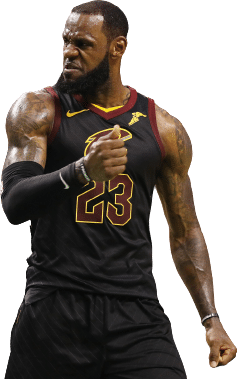
#1 - LeBron James
(A.K.A: King James, The Kid From Akron, GOAT James)
- Arguably the best floor-raiser ever, two-way player who in his prime could guard 1-5 on defense, while averaging 27ppg on high efficiency. Additionally, he has surpassed Bird as the best passing small-forward ever, with reasonable comparisons to Magic Johnson. LeBron’s passing accuracy and instincts is one-of-one.
- Elite finisher at the rim, near-automatic, while having a solid postgame, and moderately effective three-point shot (which has become reliable in the clutch)
- Excellent clutch performer, from 2012 onwards: arguably the best ever since then, with the most playoff buzzer-beaters ever, and a status as the best game-7 player and best elimination-game player ever.
- LeBron’s playstyle is great at floor raising, as he is excellent at controlling the tempo and pace of the game on both ends, and is able to make game changing plays (chasedown blocks, for instance). He prefers to dominate the ball and work with an open lane so he can do what he does best: drive to the rim with his elite finishing skills, or pass the ball the shooters or other teammates and let them work. Bron can also play off ball if need be, as he showed in 2013 in Miami.
- Lebron’s B-Ball IQ is unparalleled: he has become able to recognize and process certain defensive coverages and quickly make the right decision – whether it’d be to call a pick to target a small defender, immediately pass to a shooter early before the close-out if he spots zone defense, or drive and kick-out if he sees man-coverage.
- Overall, LeBron is an all around player.
- LeBron’s playstyle, despite being excellent for floor raising, is actually not the best for ceiling raising; despite the possible excuses you can give him, Lebron has typically only won after large scale roster overhauls where superstars or borderline-superstars have been added to his teams. This is because LeBron’s aforementioned playstyle does not work with certain types of personnel:
- For instance, a defensive point guard like Marcus Smart or a player like Draymond Green would not work with LeBron, since they are not reliable ballhandlers, nor are they great catch and shoot scorers (especially Draymond).
- LeBron needs all-star floor spacing big men with great shooting like Chris Bosh, Kevin Love, and Anthony Davis. LeBron’s ability to play with an average traditional big like Valunciunas or Dwight Howard full time would not be a great fit.
- Although they won rings, LeBron was not a perfectly smooth fit with Dwyane Wade – something that even Wade himself agrees with.
- This is relevant to bring up, because it puts constraints in his ability to truly elevate his team, and his team’s ability to build a good roster around him without having to chase big names through trades or free agency.
- LeBron is not a great outside shooter, and even though he can play off-ball, he is rarely willing to commit to it full-time. This puts a constraint on the organic roster building (as finding a floor spacing big man and multiple 3&D shooters isn’t easy), which is why they need to get superstars to fill in the gap.
- In short, LeBron’s playstyle is very effective for individual statistics, and it is effective to win titles – but it still requires other superstar players to work.
- LeBron’s body language and leadership is typically good, but he has had moments where he has been lackadaisical or quit.
- LeBron did have some disappointing finals performances early in his career.
Verdict: LeBron James is easily one of the best players to ever play the game, and he is one of the best floor raisers ever. LeBron can uniquely impact a game more ways than anyone else probably in history, and LeBron has grown into one of the best if not the best big time, crunch time players in NBA history. LeBron’s fatal flaw comes in that his playstyle, while great for carrying teams, is technically not the most efficient at elevating players around him; he still needs another superstar alongside him, and some of these players have often had their games taken a backseat in order to thrive with LeBron. LeBron’s a great playmaker, and a great scorer, but these aspects of his game are not fully blended together in a way that can allow him to be productive with a large variety of players – big men that stay in the paint, defensive wings that aren’t great scorers, etc. players that other all time greats can play with. This ultimately has hurt the roster flexibility of LeBron’s teams, resulting in his team having to sign-off on high-risk, high-reward trades or signings that will ultimately result in a ring – but usually bust after a few years, and waste his championship window, and leave us feeling that he has not accomplished as much as he should have. This flaw could ultimately be the result of him not being a great natural shooter on the level of Bird, Kobe, etc. and not being willing to commit to an offensive system where’s going to be playing off-ball occasionally. And it may be the reason he isn’t the unquestioned best player of all time. LeBron’s later Finals losses weren’t him not playing well, but their roster construction being inadequate still is a reflection on him. Nonetheless, despite this… LeBron still delivers a championship wherever he goes, he has had possibly the highest peak ever, and if Cleveland’s front office had been better in his early years – or he didn’t have bad injury luck in 2015 and 2021, he might still have easily had at least 6 rings.
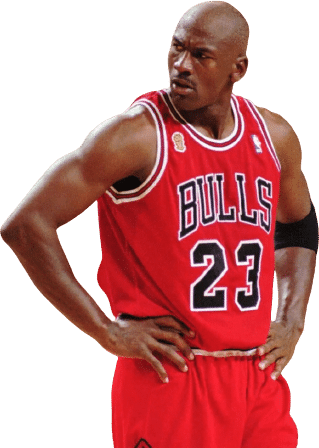
#2 - Michael Jordan
(A.K.A: Air Jordan, His Airness)
Player Comparisons: Kobe Bryant, Kawhi Leonard, DeMar DeRozen
- Elite 2 way player, extremely skilled, capable of being an excellent passer (1988)
- Incredibly consistent scorer (10x scoring champ),
- Undeniably the best clutch player in history
- Can control pace of game
- Quite literally ZERO bad playoff performances; a few mediocre ones at worst.
- Frequently carried the scoring load in playoff series where he’d receive little scoring contribution from teammates
- Strong leadership and body language
- Not a good 3pt shooter; he only shot well when the line was shortened, and this was in the 90s – when the shot had already existed for over a decade, and other players in his time and before him were better at the shot. As a result, it cannot be definitively stated that he would become a great 3pt shooter.
- Struggled against quick, 3pt-shooting combo guards: this leaves questions as to how he’d fair against such guards today. Mark Price’s Cavaliers were able to push the Bulls to 6 games several times, as well as Mookie Blaylock and the Hawks.
- Jordan himself has stated he is not sure how well he’d fair he played with today’s zone defenses. Obviously, one can argue he is being humble, but it would be interesting to see how he’d handle defenses in the playoffs that are able to trap him and throw other unique zone defenses at him.
- Although his supporting cast was not very good at the time, Jordan still lost multiple times to the Celtics and Pistons – this is something that modern players nowadays would still get heat for. Pettiness aside, it should be noted that by the time the Bulls roster rounded out, and Jordan started winning rings, the Pistons and Celtics had conveniently fallen off. Many of the players on those teams had declined and even some retired during the early 90s. So it can be stated that he didn’t beat any dynasty level teams in their primes – something players like LeBron get criticized for.
- In certain playoff series, not only would Scottie Pippen guard the best team’s defender, but he would also be the lead facilitator of the offense. This normally wouldn’t be a problem – but given that Pippen was able to make formidable playoff runs in 94 and 2000 without Michael Jordan, it can make us question if Jordan would have 6 rings if he didn’t have the fortune of playing with a genuinely top 25 player ever for most of his career: Pippen got locked into a 7 year contract that ended up being a large discount by the late 90s
Verdict: Michael Jordan is a fair pick as the best player ever. If you had to pick one to start a team with, it’d be a no brainer to pick him: arguably the most skilled player ever, he can score at will with remarkable consistency, play elite defense, and he is the best crunch time scorer, while having a playstyle that is relatively flexible – you can pair him with a point forward like Pippen, or let him be the point guard if need be. Strong if overbearing leadership usually helped get his teammates dialed in. Jordan’s facilitating was more than acceptable as well. Jordan’s weaknesses mostly come from the three-point line on both ends. He is perfect at almost everything else, but those issues could pose problems in the modern era – along with how he would adjust to modern day zone-defenses. Additionally, the level of competition he played against in the 90s is interesting to discuss. Many of the teams he beat in the 90s were not as strong and complete as the ones he lost to in the 80s – something that even he and Pippen discussed.
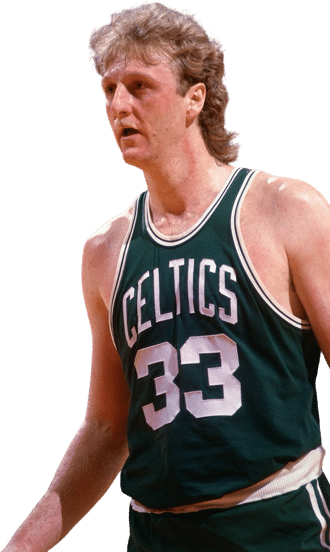
#3 - Larry Bird
(A.K.A: Larry Legend, The Hick From French Lick)
Player Comparisons: Nikola Jokic (Imagine a slightly shorter Jokic with more athleticism)
- Excellent all-around offensive player: his passing rivals LeBron and Magic, while shooting the 3-ball very effectively (especially for the era – also, the first ever 50-40-90), and with a formidable – even if – “boring” post game and midrange game. Can finish around the rim. This gave him some gravity, and opened up the game for his teammates. He could play off-ball, stay in the post, etc.
- Because of his playmaking, Bird can have games where he wouldn’t need to score too many points to be effective.
- Bird’s playstyle elevated his team, as a result. Many say Bird had a stacked team, but Bird already showed his ability to elevate teams before he even got a stacked team: Bird in his rookie year led the Celtics to the ECF – the year before Kevin McHale was even drafted, and before Robert Parish was even traded there. The Celtics won 29 games before Bird was drafted; 60 in his rookie year. Bird is both a great floor raiser and ceiling raiser.
- Bird was a good leader, and unselfish teammate.
- Bird’s defense was not great, but it was not bad either. He could make timely steals, and was overall not a guy you could consistently abuse in the playoffs.
- Bird was also a very reliably clutch shooter.
- As implied, Bird was a solid defender but not a defensive anchor. There are other wings with better defense than him.
- Bird’s scoring output in certain playoff games was not always consistent with the likes of Jordan or LeBron. Bird had some Finals games/performances where him playing better would have helped his team win.
- Bird wasn’t always careful with his body off the court. He injured his hand in a bar fight during the playoffs which affected his performance in that year’s finals, and injured his back while shoveling his mother’s driveway. Injuries like these took away years from him.
Verdict: Bird, like Duncan, has a style of play that was extremely impactful and conducive to team success. Bird had a team with some very good players – but already showed the ability to elevate his team without them, and the team suffered without him – and produced 5 Finals appearances in 13 year career (of which he was in his prime for 10 of, before hurting his back). And he did this in a tough Eastern Conference that had the Julius Irving-Moses Malone 76ers, the Bad Boy Pistons, and other solid threats like the Milwaukee Bucks and Atlanta Hawks (with Dominique Wilkins). Bird’s playstyle gives you flexibility and team elevation very few have, with his multidimensional scoring, and excellent playmaking that was often in sync with his scoring. Bird’s defense was not particularly strong, and he didn’t always light up the scoreboard in the Finals, but his career accomplishments in his prime given his circumstances are formidable.
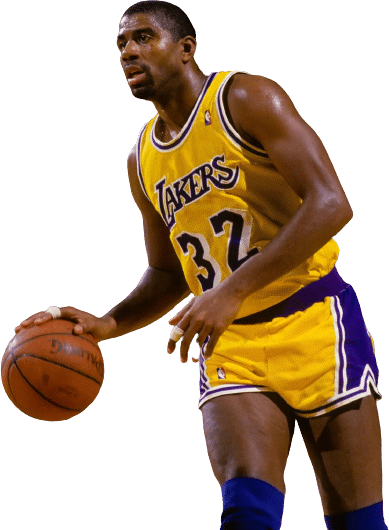
#4 - Magic Johnson
(A.K.A: Magic)
Player Comparisons: LeBron James, Ben Simmons
- Greatest passer ever, Magic had savant-level court vision, especially on the fastbreak, while still being able to score really well. This elevated his offenses to a large degree. His offensive impact prevented his defense from being a true liability (Magic was not a horrific defender, but he was not good).
- Magic’s halfcourt passing was also extremely terrific; he could often pass the ball at unique angles and pass guys open.
- Magic was still a capable scorer, and had the ability to ramp up his scoring when need be in the playoffs. Magic also was not a bad shooter either, even if it wasn’t his strength. He also shot 85% from the free throw line, which is really good for a player of his height.
- Additionally, Magic’s ball handling was also incredible as well.
- 5 of Kareem Abudl Jabaar’s 6 titles were with Magic Johnson, and Magic had 3 Finals MVPs – and more importantly, Magic led the Lakers to Finals without Kareem in 1991, showing his worth in case one tries to use the fact that he played with Kareem against him
- Magic was not very high usage, giving him great versatility. And despite this, he was still capable of having explosive scoring games.
- Magic was not good defender, and at times could be poor on that end. He struggled against quicker, nimble guards.
- Magic was a good scorer, but not a strong outside shooter.
- Magic did benefit from a notoriously weak Western conference; a notable example comes from how in 1987, the Lakers played two teams with losing records in the first two rounds of the playoffs before making the finals. Another example comes from the 86 Rockets – who beat the Lakers in 5 games en route to the finals, but had several key starters face indefinite suspension for drug usage, and who had their 2nd best player in Ralph Sampson – who many viewed as a potential H.O.F center – suffer a career-altering injury. This effectively stripped away a major rival that could have given the Lakers fits.
- Magic also had some considerable injury luck with notable examples being the 87 Celtics and 88 Pistons.
Verdict: Magic Johnson is a transcendent player, with an otherworldly ability to facilitate and orchestrate an offense in both the halfcourt and fastbreak. He may have benefitted from a weak conference, and entered a team with several established players, and his defense wasn’t great, but his ability to generate an offense and still score when need be validates him as an all time player, as does his 91 Finals run with the roster turnover from the previous Lakers teams. Magic’s touch as a shooter implies that he would still adapt well enough to the modern game offensively. His overall offense prowess with ball handling, passing, scoring, etc. would thus make it easier for his front office to mask his defensive deficiencies
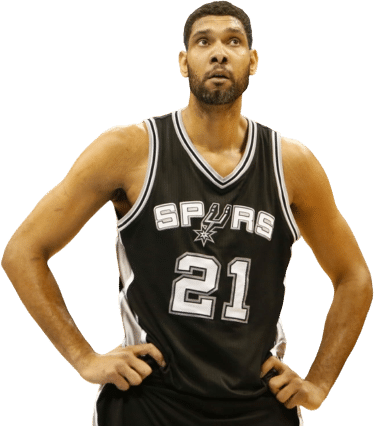
#5 - Tim Duncan
(A.K.A: Big Fundamental)
Player Comparisons: Kevin Garnett
- Elite 2-way big man, capable of playing center and power forward. Anchored the offense and defense.
- Excellent passing big man, and his multidimensional scoring allowed the Spurs to be consistent contenders despite roster turnover and scheme changes (Twin towers era in 99-2003, big three with Parker and Ginobili in the mid 2000s, and 3pt-heavy era with Kawhi). The Spurs could be flexible with their roster building and scheme since Duncan was a versatile, high BBall IQ player. Duncan could score in the post, could catch and shoot from the midrange, and in his younger days could run the floor and lay it up in the paint, while also having enough energy and mobility to move off-ball at times.
- His style of play also allowed the Spurs to be contenders even without having another superstar beside him (Ginobili and Parker were very good, but not superstars that could consistently get a team to the playoffs as the number 1 option. David Robinson was not the same in 1999 after injury).
- Duncan’s skills, as a result, gave his team’s a ridiculously high floor, and made it easy to build around him.
- Duncan’s ceiling and peak performances after 03 was lower than that of his peers.
- Only won in odd years (50-game 1999-lockout season, played Knicks without Pat Ewing. Got beat by the Lakers with Phil Jackson until 03 when the team declined from being injured all year – then proceeded to lose to the Lakers even after Shaq left. Shaq and Kobe is a formidable duo, so Duncan can’t be penalized too much for this since he played them when Robinson was injured, but losing in 08 to Kobe isn’t a good look.)
- Overlooked underwhelming playoff performances (2010 Grizzlies, 2012 Thunder, 2008 Lakers, 2013 Heat).
An excellent anchor to build your franchise around, Duncan can be the foundation of a stout defense, and the anchor of many different types of offenses. His absolute peaks aren’t the best among top 10 players when scrutinized, and this hurt him during the 7 year drought where he missed the finals despite having prime Tony Parker and Ginobili who were playing at a high level. Duncan’s skills and playstyle gives you a stupidly high floor. Even if some point out some rather disappointing playoff exits, or nitpick the lack of a repeat, his play has produced 6 Finals appearances over a 19 year career – and he did that without another true superstar in their prime playing next to him, which counts for something.
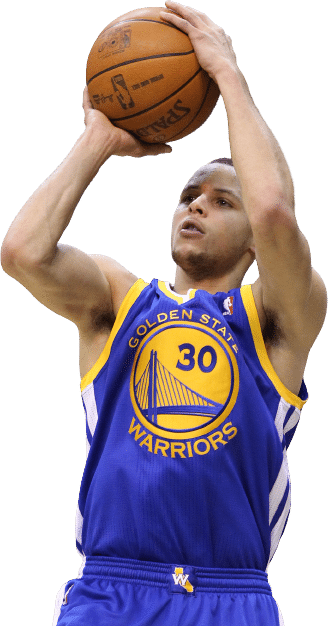
#6 - Steph Curry
(A.K.A: Chef Curry, The Chef, The Baby-Faced Assassin, Lightskin with the Green eyes)
Player Comparisons: Reggie Miller, Ray Allen, Allen Iverson, Mark Price
- Greatest shooter ever: Curry’s ability to shoot the 3-ball in all circumstances – off the dribble, off screens, in transition, while contested, off-balanced – and from the distance he launches his shot, combined with his frequent off-ball movement (which he is also an all-time great at) gives him otherworldly gravity that opens up the game for his teammates. Curry is notable for being capable of making shots that used to be frowned upon and considered bad. This is perhaps his biggest impact on the game.
- Curry is considered arguably the best ceiling raiser ever, for this reason.
- Draymond Green is able to play 4v3 and make easy passes and get wide open shots due to Steph drawing coverage from large distances.
- Players like GPII that are strong on defense but weak on offense can fit in seamlessly; the Warriors are able to run a motion-based offense that can generate buckets, due heavily in part to Curry’s willingness and ability to move around without the ball and his shooting threat.
- Klay Thompson has a greenlight that most players like him wouldn’t have, as he is a 3pt shooting guard that does not have strong ball handling skills; Klay would usually be relegated to being a basic spot-up shooter on another team.
- Curry is typically an elite finisher at the rim as well, with great handles. His passing is good, given the motion offense they play in that can be prone to turnovers.
- Curry is also unselfish on the court, willing to distribute exclusively if his shot is struggling; this personality trait, combine with his playstyle strengths, give enormous value to his team, which is why he is considered arguably the best ceiling-raiser ever
- The value Curry brings gives him a similar impact to that of Larry Bird and Tim Duncan; they can elevate rosters that, on paper, are merely good but not great, and turn them into Finals contenders, due to their unselfish play, multi-dimensional scoring, and willingness to pass and set up teammates. This helps his team’s roster flexibility, and their team’s ability to run different offensive schemes.
- Late in his career, he became a moderately above average defender. Always typically good with steals
- Great leadership; calm, confident, unselfish leadership; him coming off the bench against Denver in the 2022 Western Conference 1st Round helped nullify any potential friction between Jordan Poole and Klay Thompson. This is huge, as this is an under-discussed strength that has hurt other players like Shaq, Chris Paul, and Kobe.
- Curry has been a really good playoff performer, but he has not consistently reached his regular season heights in the playoffs, let alone exceeded them, when he’s needed to. Compared to other top 10 players like Lebron, Jordan, Shaq, Duncan, Magic, etc. a disproportionately large amount of Curry’s best games have been in the regular season.
- His 2016 and 2019 Finals performances were series where elevating his play or even reaching his regular season heights (game winning shots, 10 3pt games, 40 point games a little more frequently) was not done.
- He can turn the ball over recklessly at times
- Used to be a bad defender, and during the middle of his career, when he improved, he could still be targeted defensively (2016 Finals, 2019 Finals). His offense has usually made up for it, but it didn’t always, like in the aforementioned finals.
- Has not had success with playoff game winners, particularly in the Finals. Curry is 0-12, or 0-14, on game-winning or go-ahead attempts in the final minute of playoff games. This is damning, as several players – even players that are derided for the playoff performances – have at least made one. Luckily, when Curry is playing at his best, they can frequently avoid being in these situations – either by blowing their opponent out, or by closing them out early enough (such as in the 2019 WCSF against Houston in game 6, where Curry dropped 33 in the second half, or game 4 of the 2022 NBA Finals). But it has cost him, and has prevented his legacy from being even greater than it could have been.
Verdict: Curry is game-changing player who not only redefined shooting in the NBA, but his style of play and leadership has spearheaded a dynasty that is almost on the level of the 90s Bulls and 80s Lakers. Curry is one of the best ceiling raisers ever, if not the best, and as a guard can still be impactful without needing to score. Curry is also one of the best leaders ever, and is unselfish on court and in the locker room. Curry’s defense used to be a major area of concern, although he has mitigated this significantly as his career has gone on. Turnovers are a problem Curry has, and he initially lacked the playoff heroics or consistent playoff domination that others had – Klay Thompson and Kevin Durant used to pick up the slack here. However his 4th title saw him average 31 ppg against the best defense in the league, in a series where his co-stars – Klay Thompson, Draymond Green – were wildly inconsistent, and Andrew Wiggins provided the only consistency. Curry’s 4 rings in 8 years is an all-time feat – and any discussions about him not being the best player for 2 of those championships is nullified by Curry not only drawing most of the defensive attention in those series, but also Kevin Durant not having won without him. Verdict: Curry’s brand of basketball is, to say the least, lethal, and elevates the legacies of his teammates around him, and is quite objectively reliable for competing for championships.
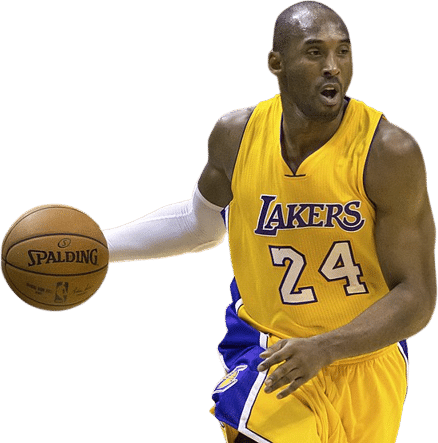
#7 - Kobe Bryant
(A.K.A: The Black Mamba, Bean, Vino)
Player Comparisons: Michael Jordan, Kawhi Leonard, Zach Lavine, DeMar DeRozan
- Absurdly skilled: Essentially Michael Jordan with a better 3pt shot, and slightly worse athleticism. Kobe is arguably the most skilled player of all-time.
- Kobe could finish strongly in the paint, and his footwork was perhaps the finest of any player ever, allowing him to be a killer in the post as a shooting-guard, and make tough shots.
- Kobe was also a great pure shooter, being able to shoot from anywhere in the court, and his tough-shot selection makes his shooting stats look worse than they should be.
- Kobe’s aggressiveness and multi-dimensional scoring on offense opened things up for his teammates, giving him some gravity. Kobe was very active without the ball, often being able to cut and slash to the rim as well as move around on the perimeter off-ball. This gave the Laker’s offense more flexibility. Additionally, Kobe was
- Despite playing with Shaq – who was the better player when they were together – Kobe was not given a free ride in those playoff runs; he was just as important as Shaq in some series, and was still guarded by the other team’s best perimeter defender. Shaq was instrumental in helping Shaq’s pick’n’roll defense.
- Very aggressive and very good crunch time player, even if mythologized
- His late 2000s Finals runs validate this, as he made it out of the west 3 straight years with rosters that weren’t much better than that of the 09 Nuggets, 08 Spurs, Jazz, etc.
- Later in his career, became a better leader with stronger interpersonal skills that encouraged teammates to play harder for him
- A fair share of bad playoff performances for a player of his caliber (2004 Finals, 2011 sweep against Dallas, 2012 loss against OKC)
- Leadership and attitude caused issues with teammates in the past. Kobe has outright quit on his team more than any other top 10 player.
- Selfishness on the court seriously hurt team (it quite literally cost the team the 2004 Pistons Finals)
- Poor shot selection at times and occasional unwillingness to pass hurt his team several times in these playoff losses.
Verdict: Kobe Bryant is one of the most skilled players ever, and he managed to anchor several NBA Finals teams even after Shaq left – and with Shaq, formed the best duo of the 21st century. Kobe’s weaknesses are the same as his strengths: his mindset – the same mindset that gives him his aggressiveness and ‘mamba mentality’, also led to him having games where he’d either take bad shots, refuse to pass, or get in his own head and miss many shots, thus hurting his team. And if not that, then he would occasionally quit on his team.
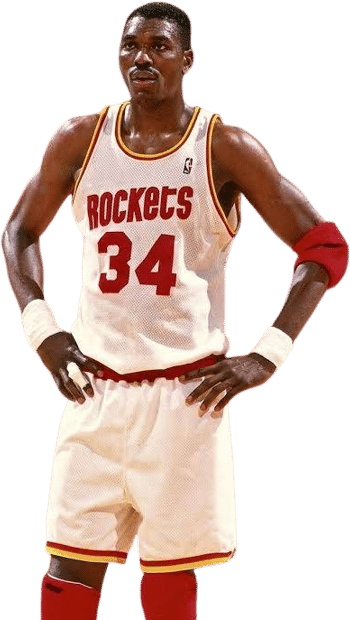
#8 - Hakeem Olajuwan
(A.K.A: The Dream)
Player Comparisons: Joel Embiid, Kevin McHale (Imagine these two fused together)
- Phenomenal defender, arguably the best rim protector ever, while also being an excellent scoring big man with a top 3 post game in history.
- Hakeem could handle big-men in the paint, but also had the agility and lateral movement to not get blown by more nimble forwards and even some guards on the perimeter.
- Hakeem was a great shooting big-man particularly in the post, and had impeccable footwork that give him many moves and countermoves against even the best centers of his era. His post game was dynamic, using up-and-unders, fadeaways, spin moves, etc. that many players could not contain.
- Hakeem was a strong finisher in the paint, as his athleticism and length allowed him to make strong layups and dunks as well.
- Hakeem was also a great free-throw shooter.
- Ultimate 2-way player, with arguably the greatest peak in NBA history (94-95)
- Not very great against double-teams; Hakeem’s passing was suitable but not on the level of other all-time bigs. There was a little tunnel vision with him as a scorer, and this hurt his team-elevating at times, and left him liable against other great players.
Verdict: Hakeem Olajuwan is one of the most gifted centers in league history. His tunnel vision and mediocre playmaking did hurt his team’s ceilings (something the Seattle Sonics exploited with their traps and doubles), and thus meant that he had to rely on all-time scoring and defensive performances to carry him to championships. However, these runs were some of the best runs ever. Furthemore, Hakeem did have periods of weak talent on his teams; during the late 80s, his running mate Ralph Sampson was injured and eventually traded, while many backcourt players on the team were indefinitely suspended on drug charges; this created a void in his prime that understandably resulted in him missing the playoffs. He won with Clyde Drexler, who was still good, but older and not quite the same, and Vernon Maxwell, who left after 1995. Hakeem didn’t have many great players to play with in his prime, which affected his championship runs.
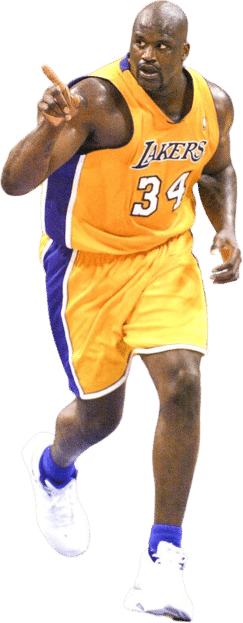
#9 - Shaquille O’Neal
(A.K.A: Shaq, Diesel, Superman, The Big Shaqtus, The Big Aristotle, The Big Shamrock)
Player Comparisons: N/A
- Most dominant player in his prime: averaged 30ppg with a plethora of reliable post moves (jump hooks, spin-around alley-oops)
- Shaq was effectively unguardable in the low-post, to say the least. His combination of size and strength and agility made him a nightmare to guard and impossible to push around.
- Shaq was a good passer, being able to find cutters and throw passes at the right angles
- Wilt-like dominance without being as turnover prone or as much of a ball-stopper
- Good defender
- He’s a “good” defender, but not there defensively like Hakeem, Robinson, etc. Shaq was especially vulnerable when having to guard away from paint. Teams would target him in PnRs, and teams with shooting big men would often make it a strategy to shoot with their bigs to force Shaq out of the paint and bring him to the perimeter, where he lacked the speed and agility to defend as well
- Shaq was a good passing big, but not elite like Robinson, Russell, etc.Shaq could make the right pass, but was not have elite court vision.
- Shaq was a strictly low-post player. This hurt his versatility, and thus hurt his playmaking to an extent, as he couldn’t stand away from the paint and give more rim to cutters the way guys like Robinson or Duncan could.
- Shaq’s leadership and immaturity were lacking: “lazy” is a bit of stretch given that most big men don’t age well after 35, but in his prime, there were still question marks (“hurt on company time, heal on company time”)
Verdict: Shaq was an excellent player, one of the most dominant players to ever play. But his leadership and lackadaisical attitude did cause certain great situations to not end well even if he wasn’t all at fault (he was the common denominator though!). Shaq won when he had elite 2-guards – Kobe Bryant and Dwyane Wade – and got to play with many great teams throughout his career. Shaq didn’t have many stretches where his team was bad after 93
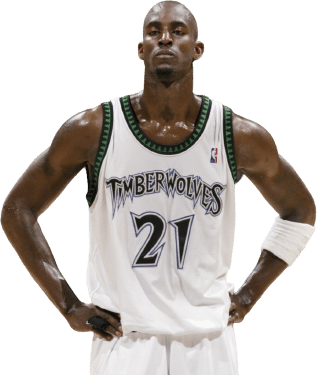
#10 - Kevin Garnett
(A.K.A: KG, The Big Ticket, The Kid)
Player Comparisons: Tim Duncan, Anthony Davis
- Garnett is one of the most skilled forwards ever: Garnett was a good post player, with great facilitation and passing skills, and is among the best defensive big men ever, right up there with Hakeem, Russell, and Robinson.
- Garnett is arguably the best defensive player ever, as not only was he great in the paint, but he had insane agility to keep up and trap perimeter players. His nimbleness was key in the Celtics being able to beat the Lakers in the 2008 Finals: He allowed the Celtics to overload Kobe’s side of the court, while still being able to handle Gasol.
- He can score in the post, shoot from the midrange, and also shot really well on very long twos – which in today’s game, would probably be 3-pt shots. This gives him great versatility within an offense, as he can score all around the court, play off-ball, be a point forward, and a traditional big man. You can imagine that he would be shooting 3s really well in today’s game.
- Garnett was good at creating open shots, as he could anticipate passing lanes, and leverage double teams; his teammates inability to hit these open threes (and being one of the worst shooters in the league) is not his fault,
- Garnett’s skillset is theoretically easy to build around, as a result.
- Garnett’s skillset is a huge reason why the Celtics were able to get over the hump and make 2 finals, and why he was responsible for Minnesota’s only playoff series win in their history. His 04 season is one of the finest in history: with Sam Cassell and LAtrell Sprewel as his co-stars, he led Minnesota to 60 wins, a number 1 seed, and pushed the 04 Lakers to 6 games despite Casell getting hurt missing all of the series after game 1.
- Garnett’s playoff losses weren’t predominantly due to his poor play; for much of his time in Minnesota, he lost to teams that were objectively much better than his.
- Garnett was a very passionate and strong leader, and many teammates have spoken positively off him.
- Garnett at times could be somewhat passive when choosing to score; he had the skill to go off and drop 30-40 points, but the aggressiveness was not always there.
- Garnett’s post game was good, but it was never the best in the league
- Garnett’s massive contract in the 98 season may have contributed to Minnesota not being able to spend more on free agency. Although, this does not excuse any poor drafting.
Verdict: Garnett is one of the few cases where a front office genuinely completely dropped the ball on a star player. Throughout this list, we’ve seen how a player’s skillset can affect the talent around them. Typically, their skills can dictate the types of players the front office can draft, sign, or trade for. This means that a player does have some influence on the players around him. KG, from a skill-set perspective, did not have major flaws that would have made it difficult for Minnesota to build around him – as proven by how seamlessly he fit in with Boston. He was less ball-dominant offensively, yet still had a DPOY season and was an MVP candidate, and knee injuries prevented what could have been a dynasty. Overall, KG is a great player, great leader, and is one of the few players who can genuinely say that a different situation could have drastically changed their legacies.

#11 - David Robinson
(A.K.A: The Admiral)
Player Comparisons: Bill Russel, Anthony Davis
- Excellent 2-way player: in his prime, he was arguably a top 3 defensive center ever, and was an elite scorer who led the league in scoring with his excelling face-up shooting and finishing around the rim to pair with his athleticism and dunking.
- Robinson was an elite athlete, and could even lead fastbreaks, and guard on the perimeter
- Elite playmaking and facilitating; these traits were arguably as great as his scoring and defense, as Robinson was a three way anchor for the Spurs with no other superstar until 1998. Robinson was excellent at not only finding open players, but also seeing guys open, timing his passes, giving room for guys to cut.
- Weak post game hurt him in the playoffs against elite big men
- Despite being one of the best defensive big men ever, he could get outplayed against other big men in the postseason.
- Only won rings when Duncan arrived and was the better player of the two, despite the supporting cast not really being great in 1999.
Verdict: David Robinson was an elite two way player who provided some of the best floor raising in NBA history: his rookie year spearheaded one of the best season-to-season turnarounds in NBA history, and played much of his prime without any single notably great scorer to help him. The flaws in Robinsons’ game (poor post game, and occasional moments where he would fold) left him liable to be stifled in the playoffs until Duncan came, but an important caveat to note is that he is one of the few elite big man to never play with an elite backcourt player in his prime to take pressure off of him (Shaq had Penny/Kobe/Wade, Kareem had Oscar/Magic, Hakeem at least had Drexler and Maxwell, Malone had Stockton, Anthony Davis had LeBron, etc.), hence why he should still be regarded. His tendency to be outplayed by the other team’s center on both ends might still get in the way, but playing with an elite backcourt player long enough could still nullify this.
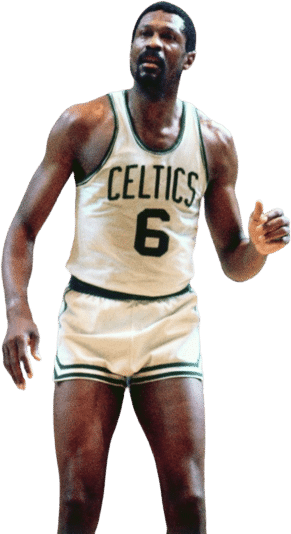
#12 - Bill Russel
(A.K.A: N/A)
Player Comparisons: Draymond Green, Bill Walton, Ben Wallace
- Best defensive center of his era
- Great facilitation that elevated his teammates
- Strong in transition for a big man
- All-time great rebounder
- Great basketball IQ: Russell would often tap rebounds to his teammates
- Excellent leadership, and strong-willed leader in a difficult era socially
- Weak scoring arsenal for an all-time big man
- Had a great cast of players, debate as to how much he elevated them vs them already being great players
Verdict: Despite Russell not being a great scorer, Russell’s distribution of the ball and all-time defense and rebounding in an era where most teams still scored closer to the paint were invaluable. Although Russel had great teammates, many of them weren’t as successful as they were with Rusell in the years preceding him and succeeding him. Russell spearhead 11 rings in 12 Finals appearances in his 13 year career, including 8 straight titles – and the Celtics were markedly different before and after him. Russell elevated his team as a defensive anchor and knew how to generate the offense efficiently, and was a very good athlete. In an era with 8 teams, many try to discredit his championships. One could dispute this by saying that having less teams means that all of them are really good, even due to the higher concentration of talent. However, having less teams means that there is a higher chance of Russell having good teammates that can mask his flaws a lot more than they would if he played in a 30 or even 20 team league where the talent is more spread out. Additionally, one has to wonder how much he would translate to today’s game, where, thanks to lax dribbling rules, freedom of movement, and the three point line, many of the best players are often not big men anymore – but rather perimeter wings. Many of the best big men historically, in general, and especially now, are averaging over 25 points a game, and are expected to be able to hit an open 3pt shot.
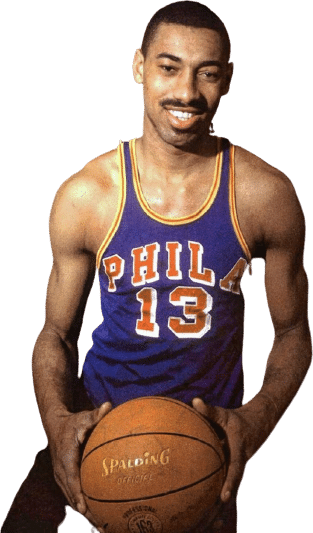
#13 - Wilt Chamberlain
(A.K.A: Wilt the Stilt, Big Dipper)
Player Comparisons: Giannis Antetokounmpo, Anthony Davis
- Greatest athlete to ever play the game, Wilt was literally unstoppable when he got the ball in his hands and looked to score – he averaged 50 for a season. He was a machine:
- Wilt had an elite finger roll, post fadeaway shot, and was great in transition. His length allowed him to dunk – even off inbounds – to the point where rules were changed.
- When Wilt had to pass, he was capable of leading the league in assists. And his defense was really good as well.
- Elite athleticism, Wilt was 7ft with absurd strength and speed and verticality for his size and build. This allowed him to effect the game at every level.
- Wilt was not effective at synchornizing his passing and scoring together to generate an elite team offense and elevate his teammates: he would always set himself up in a predictable spot or stance when looking to pass or score. This is why his team’s offense did not always correlate with his scoring.
- Wilt had a tendency to be a blackhole scorer: when looking to score, he would have poor court vision and thus have possessions with bad turnovers caused by traveling or three-second violations, where he could have passed instead (although, the rules were more strict on offensive players back then, so this would probably be reduced nowadays).
- As a passer, would never create or anticipate opportunities: he would solely rely on others getting open and cutting, which doesn’t elevate a team’s offense
- Wilt’s leadership was not particularly great; he wasn’t disliked by his teammates, but he didn’t have a great fit with them.
- All of these can create the perception that he is playing to optimize his stats, rather than help the team win games
Verdict: Wilt Chamberlain is an absolute physical specimen and scoring machine. This alone gave his team a high floor – which is why he was able to make the Finals several times – but his style of play prevented his teams from being able to go win as many rings as they should have, as Wilt was not an effective playmaker that could either use his gravity to set guys up or have court vision to see plays develop. Wilt played with a number of teammates that were good, but aren’t all as well regarded as those on the Celtics – this could be a function of Wilt’s previously mentioned lackluster and rigid playmaking though, as that is worth considering. Wilt’s teammates could be better regarded if his playmaking was elevated, which would have helped him win more rings.
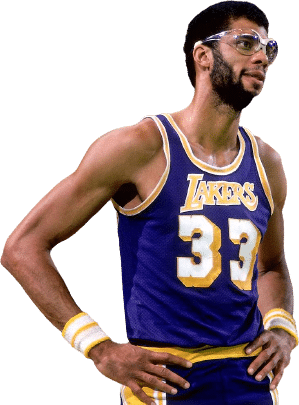
#14 - Kareem Abdul Jabaar
(A.K.A: KAP)
Player Comparisons: N/A
- A machine of a scorer, Kareem was a 7 footer with an unguardable move – the sky hook – and a really good defender in his prime. Kareem is the ultimate weapon player.
- Kareem was the focal point of the offense in the early 80s era Showtime Lakers. You could feed him the ball frequently as your offensive strategy, and Oscar got his first ring with him.
- Kareem’s style of play and overall fitness kept playing at a high level for nearly 20 years, making him a valuable asset.
- Kareem was not a blackhole player – he was willing and able to pass the ball to open teammates.
- Despite being a great scorer, Kareem didn’t demand doubles at the rate centers like Shaq or Hakeem did: it was not uncommon to see centers stifle Kareem.
- Kareem, for all his strengths, still needed elite, generational point guards to even field a consistently good team, let alone win rings; although every player needs help, Kareem’s case is unique in that without Oscar and Magic, Kareem often did not come close to fielding a legitimate contending team – twice, he missed the playoffs (one of these seasons, he was injured to be fair). Oscar and Magic only won with Kareem, but they both fared better without him than he did without them.
- Many use the fact that his team’s weren’t good, but it should be noted that in the 1970s, the talent pool was split among the ABA and NBA through 1976, and there was no other dominant team in the era (it was the era of parity).
- This is a consequence of his style of play; Kareem was not a very strong facilitator. He was not a ball stopper or blackhole player, but he often did not elevate his teammates with his style of play. This is why he and Adrien Dantley were not a good fit. Dantley was a iso-heavy scoring guard.
- Shaq and Kobe were able to fit despite Kobe also being an iso-scoring guard.
- Kareem played before blocks were recorded in his early career, but blocks do not alone make you excellent defensively, and other centers during Kareem’s career were viewed as better defenders than him.
- Additionally, we again roast modern players that have missed the playoffs frequently. Kobe and Curry have been criticized for seasons where they missed the playoffs in their primes.
- Kareem had a string of bad playoff losses in the 70s that modern players would be roasted for: in the 73 WCSF, Kareem was stifled by Nate Thurmond, whose team only won 47 games compared to Kareem’s Bucks who won 60 games. In the 74 finals, the Bucks lost in 7 to the Celtics – but Dave Cowens thoroughly outplayed Kareem in that series. Dave Cowens was an excellent player, but Kareem should not have been outplayed by him given that he is supposed to be the better player.
- Kareem’s leadership was not particularly noteworthy. He was rather aloof as a teammate, and had some brief anger issues in the 70s – this is important, because his anger directly led to two hand injuries that led to him missing games and his team missing the playoffs
- There are other centers that are better passers (Robinson, Walton, Russell) and defenders (Hakeem, Robinson, Russell) than him. Kareem was not strong enough on these ends.
Verdict: Kareem is an absolute machine of a scorer, with great longevity, while being a really good rim protector. However, his playmaking was lacking: he was not a notable passing big man, nor did he demand double-teams which could have given him gravity. This meant that Kareem could not elevate teammates very far, and as a result, his style of play necessitated a very strong point guard to go far with (Oscar Robertson, Magic Johnson, who were the best point guards ever at the time). As a result, Kareem is more of a #2 than a pure #1 option.


Man I don’t know I respect your articles but putting Kareem outside the top 10 is crazy. You can’t discount accolades THAT much